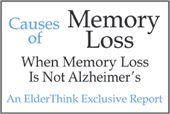

Folic Acid and Vitamin B12
Do They Help Fight Alzheimer's Disease?
Gretchen Heuring for ElderThink
This 3-year study, called the FACIT Trial, was conducted in the Netherlands by a team of researchers. They gave 818 participants either a daily oral dose of folic acid or a daily oral placebo. Tests were given to the participants including memory, speed of motion, speed of recognition, information processing speed, and word fluency. After three years, changes were signifantly better for participants who took the folic acid.
So What Does This Mean?
Usually, people with a folic acid (also called folate) deficiency are also deficient in vitamin B12. Some symptoms are similar so it's important to be tested for both.
Folic Acid Deficiency Symptoms
These symptoms might be hard to notice at first. They might include fatigue, prematurely grey hair, mouth sores, a tender tongue, pale skin, irritabilty and diarrhea.
B12 Deficiency Symptoms
Usually, when there is a folic acid deficiency, there is also a B12 deficiency. B12 symptoms include all those noticed for folic acid, such as numbness or tingling in the hands or feet, memory loss, paranoia or hallucinations, and general weakness.
A Cure for Alzheimer's Disease?
There is wide-ranging controversey about folic acid and B12 supplements to aid those with Alzhimer's Disease. Research is continuing, but meantime, supplements are readily available and might help.





